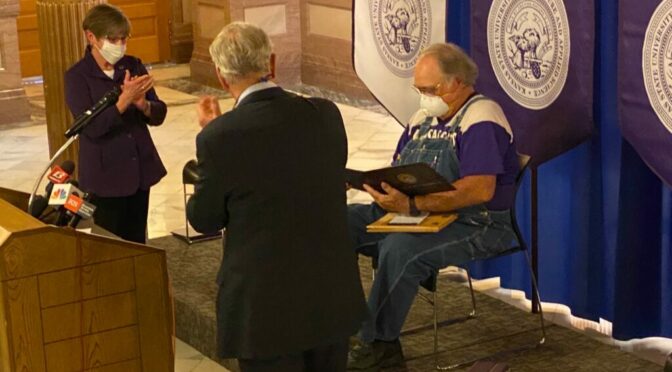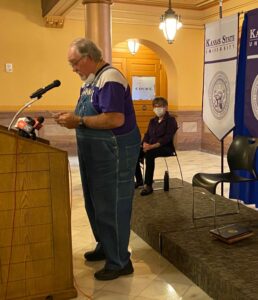KDADS Implements New Steps to Safely Maintain State’s Psychiatric Hospital Services
TOPEKA – Kansas Department for Aging and Disability Services (KDADS) Secretary Laura Howard announced proactive steps to keep the state’s two psychiatric hospitals operating while keeping patients and staff safe during this pandemic. The principle behind these steps is to manage the state’s critical mental health infrastructure while creating capacity to quarantine any new patients in a single room for symptoms monitoring for up to 14 days after admission. Additionally, the hospitals have planned for isolation of any symptomatic or COVID-19 positive patients.
To implement this plan at Larned State Hospital (LSH), KDADS will work with the courts and providers to temporarily adjust hospital occupancy and actively manage a waiting list in response to COVID-19 as part of the hospital’s Pandemic Response Plan. Voluntary patients to Larned’s psychiatric services program will be diverted to community hospital resources under a diversion plan. Involuntary admissions will be accepted. Should the reduced occupancy require it, a waiting list will be established and those admissions will be on a first-come, first-served basis.
“Because this plan involves a reduction in the number of state hospital beds available at Larned, resulting in a possible delay in the ability to admit people, we are making a formal notification to the court of our plan to establish a managed moratorium,” Secretary Laura Howard said. “To help alleviate the effects of this reduction, we are tapping into the strong partnerships we’ve established with community partners like community mental health centers, private hospitals and law enforcement to identify community-based resources for voluntary admissions and beds.”
Pursuant to KSA 59-2968, the Secretary of KDADS is authorized to declare a moratorium on admissions to a state psychiatric hospital and must make a formal notification to the Chief Justice.
Osawatomie State Hospital (OSH) is also taking steps to safely manage patients through a shift to single patient rooms, the creation of a triage unit and the creation of isolation units to quarantine admissions and safely isolate COVID-19 positive or suspected positive patients. This results in a small census reduction that may have a slight impact on the hospital’s current waiting list.
The goal is to keep the state’s behavioral health hospitals open to receive patients referred for treatment in a way that protects staff and other patients from exposure to COVID-19. The principle is to manage the state’s critical mental health infrastructure while creating capacity to quarantine a new patient or offender in a single room where they can be monitored for symptoms for up to 14 days after admission to determine his/her risk of COVID-19 infection. For forensic cases ordered to the State Security Hospital at LSH, during the pandemic, very limited evaluations are being conducted to minimize opportunity for exposure to possible COVID-19, especially from jail settings. KDADS has used mobile competency with success over the last several months and will request that courts consider allowing mobile competency evaluations and treatment orders as a viable alternative to inpatient evaluation when the pandemic subsides.
The proposed shift to single rooms and active quarantine of new patients in the intake and treatment units reduces each hospitals’ capacity to admit referred patients at the same pace, resulting in longer waiting times for admissions but will improve their ability to manage the inflow of patients that could potentially be infected with COVID-19 and assess impact on other patients and staff. The impact of the capacity changes at LSH reduce available psychiatric services beds from 90 to 72 for patients and at OSH from 60 to 58.
The ability to create quarantine rooms at Larned and Osawatomie involves arranging what are now most often double-occupancy rooms into single rooms in units that receive new patients or adding bed space on campus to house incoming patients during the 14-day quarantine period.
“Both hospitals are actively screening admissions for COVID-19 symptoms,” Deputy Secretary of Hospitals and Facilities Scott Brunner said. “Implementing this temporary census management protocol allows us to effectively isolate new admissions to improve the ability of the medical staff to monitor and manage health conditions while reducing the chance of exposure of hospital staff and other patients.”
LSH began actively screening staff, including taking temperatures, on March 27, 2020. At OSH, these safety measures for staff were implemented March 24th.
Throughout the period that a moratorium is in effect, a district court or Community Mental Health Center (CMHC) may request that an individual be placed on a waiting list for involuntary admission. When the census drops below the new occupancy level, an admission will be arranged with a court or CMHC according to the chronological order in which individuals were entered on the waiting list maintained by the respective hospital. If there is no waiting list, the hospitals may admit the next individual who meets admission criteria
COVID-19 has also reduced the options for patients ready for discharge. Many of the programs, shelters and nursing facilities that prior to the COVID-19 outbreak would have accepted state hospital patients on discharge are closed to new admissions. KDADS is working with partners to create discharge paths to ensure the adult mental health system can function across the continuum of care.
KDADS plans to engage help from HealthSource Integrated Solutions (HIS) to identify regional diversion beds for patients that could be referred to LSH. HIS currently does this for OSH. The Larned staff will continue to move patients through treatment and moving them back into community services.

